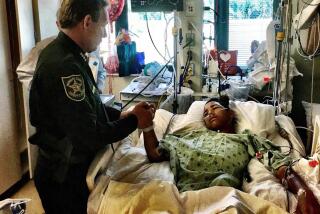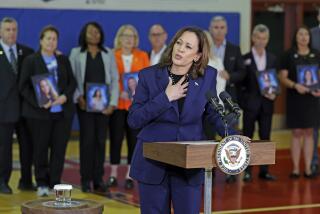Family that took in Florida shooting suspect Nikolas Cruz hit with lawsuits and criticism
Reporting from PARKLAND, FLA. — Some see them as saviors who opened their home to a grieving young man after his mother died. Others say they were naive or negligent and failed to properly supervise a dangerous 19-year-old and his cache of guns.
James and Kimberly Snead let Nikolas Cruz move into their Parkland, Fla., home for the 2½ months before he was charged in the attack on Marjory Stoneman Douglas High School that killed 17 people and injured 17 others. They say their act of kindness had tragic consequences they never imagined.
The Sneads, who say they felt sorry for their son’s 19-year-old friend after he was left orphaned, have already been named as defendants in two civil lawsuits connected to the Feb. 14 attack at the Parkland school.
One is a wrongful death claim filed by the estate of 18-year-old Meadow Pollack. The other is a negligence complaint filed by the parents of Anthony Borges, the 15-year-old who survived five bullet wounds.
The Sneads anticipate they will be named in more lawsuits in the coming weeks and months. They say they fear the litigation will rapidly drive them into bankruptcy and they don’t have the money to even hire an attorney to defend them.
“We’re like many other families in America today. We live paycheck to paycheck,” James Snead said in an interview Thursday.
Since the shooting, the family has been commended by some.
People nationwide have sent them cards and letters, praising them for taking Cruz into their home and commiserating about how it all went horribly wrong. The Sneads said they knew only that Cruz was depressed by his mother’s death, that he had been involved in fights at school and that he seemed immature and quirky.
But they’ve also been scorned as ludicrously naive or willfully blind for letting their son’s relatively new friend move into their home with his collection of guns, including the AR-15 he used in the slayings.
The lawsuits filed against the Sneads allege they should have known Cruz was mentally ill and posed a threat to others. The Pollack and Borges families are seeking damages. Also named as defendants in the Pollack lawsuit, for now, are former Broward Sheriff’s Deputy Scot Peterson, the estate of Cruz’s mother, Lynda, and two mental health agencies that may have treated Cruz. The Borges suit names the Sneads, the two mental health agencies and the estate of Cruz’s mother. The sheriff’s office, school district, FBI and others may be sued later.
The Sneads said they rent their home and don’t even have renters’ insurance. They said they’ve been told it would cost them about $20,000 up front — and a lot more down the line — to hire an attorney to defend them against the lawsuits.
Though their critics don’t believe them, Snead says he and his family saw no warning signs that Cruz would turn violent. They said he was pleasant and followed their house rules. They tried to get him re-enrolled at Stoneman Douglas, but officials declined to take him back so they enrolled him at an off-campus learning center, run by the district, at Rock Island Professional Development Center in Oakland Park. They said he seemed to be doing well there and district officials never gave them any warnings about Cruz’s behavior.
Stones and beer bottles have been hurled at their home on a quiet road in Parkland. Some drivers yell obscenities and insults as they drive by. On occasions when they’ve been recognized in public, picking up groceries or running errands, some people have muttered “negative things” under their breaths. They’ve also had to try to defuse encounters with others who want to take them to task and debate the matter with them.
Questions have also been raised publicly about their actions and motivation.
A woman who called the FBI’s tip line on Jan. 5 — less than six weeks before the massacre — reported her concerns about Cruz’s gun ownership, his disturbing social media posts and the potential that he might carry out a school shooting. The FBI has admitted the call, from a close friend of the Cruz family who has not been publicly identified, was mishandled and the information she provided was not investigated until after Cruz struck.
According to a transcript of that recorded call, the woman also gave the FBI Snead’s name, address and phone number: “I have the man’s name who uh-I-we’ve, the family and I have tried to call this gentleman and he refuses to return any phone calls.”
“And um, an aunt of his has, had called him. Another woman who was taking care of Nikolas, uh, who had already spoken to him tried to call him. I tried to call him just to find out how Nikolas was and to make sure he understood the problems … he has. And he just doesn’t return any phone calls, which if you’re going to help somebody and you know there’s family involved, at least return the phone calls and talk to them about it. Or, you know, return the phone call and say mind your own business.”
Snead says nobody from law enforcement contacted him about Cruz until after the shooting. He said he spoke several times with a woman he thinks was a “distant aunt” of Cruz’s who lives in New York, but nobody else. The relative expressed concern only about Cruz’s bereavement and his depression and also appeared to be checking on whether the Sneads were appropriate housemates, he said.
“The aunt in New York called several times and left messages and I called her back and we talked several times…. She was genuinely concerned for his wellbeing and what was going on with him,” Snead said. “I don’t recall her saying anything negative about him at all.”
Snead said he does not recall receiving any voicemails or messages from other relatives or family friends and thinks he would have returned them at the time if he did.
The woman who called the FBI also indicated that Cruz had declined to communicate with her. She told the FBI she knew that Cruz was expecting to inherit at least $25,000 and had told someone that Snead was going to invest it for him. The woman expressed concern about if that was appropriate and also said Cruz “gets crazy” and suspicious about his money.
Snead said he never tried to get his hands on Cruz’s inheritance but did offer to take Cruz to a bank and have him meet with a professional financial advisor: “I didn’t want him to go out and blow it.”
Cruz didn’t pay rent but occasionally contributed $50 to household costs, they said.
Snead is an Army veteran who now works for a construction management firm. His wife is a neonatal nurse. Both grew up around guns and are comfortable with them.
Their son, a junior at Stoneman Douglas, was on campus during the shooting and fled with other survivors. Snead already knew his son was safe and was driving to pick him up when law enforcement called to ask where they might find Cruz. When Snead figured out Cruz was the shooter, he asked police to rush to his home immediately because he feared Cruz might have killed his wife, Kimberly, before embarking on his rampage.
Their son, whose name they don’t want published, knew Cruz’s younger brother Zachary before he met Nikolas, Snead said. Their son and Nikolas were both in ROTC at the school and met through a mutual friend. That friend and his dad took the teens on hunting trips, Snead said.
When Cruz asked if he could bring his guns to their home, they said he could but they made him buy a locking gun cabinet and said he would need their permission to take out the guns. Snead said he thought he had the only key to that cabinet but now believes Cruz — an adult who legally bought the guns — had another key. Snead said the gun safe he bought for his own weapons has only one key.
Other critics have questioned how the family didn’t know about Cruz’s disturbing postings on social media before the tragedy. The parents said that they’re not savvy about social media and that Cruz had multiple accounts. Some of the accounts had only innocuous postings and some had disturbing postings, which were reported to law enforcement by at least two people who saw them before the killings.
“The FBI and BSO went through my son’s phone and realized that the only account my son knew about was basically I guess what you’d call ‘the good account.’ These other accounts that he had, I didn’t know about, my son didn’t know about, and my wife didn’t know about.”
Snead said the family’s biggest fear after the tragedy was about whether it was safe and appropriate for their son to return to his junior year at Stoneman Douglas. Staff and students have been incredibly supportive to his son, he said.
The Snead family set up a GoFundMe page on Tuesday to solicit donations to a legal fund. By lunchtime on Friday, $1,230 of the $100,000 goal was raised.
Snead said his family has had no communication with Cruz since the last time they saw him — when he was being led into the sheriff’s office headquarters hours after the shooting.
The Sneads said they had some tough decisions to make about possibly moving out of Parkland, though they still consider themselves very much a part of the grieving, devastated community.
Snead said he didn’t want to say anything that might cause any further pain or upset to the families whose children were killed, injured or affected in any way: “We think about them and pray for them every day.”
McMahon writes for the South Florida Sun Sentinel.
More to Read
Sign up for Essential California
The most important California stories and recommendations in your inbox every morning.
You may occasionally receive promotional content from the Los Angeles Times.










